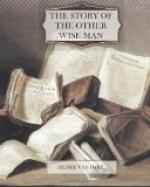She felt her steps before her delicately, carrying her head low, and sighing now and then with apprehension. At last she gave a quick breath of anxiety and dismay, and stood stock-still, quivering in every muscle, before a dark object in the shadow of the last palm-tree.
Artaban dismounted. The dim starlight revealed the form of a man lying across the road. His humble dress and the outline of his haggard face showed that he was probably one of the poor Hebrew exiles who still dwelt in great numbers in the vicinity. His pallid skin, dry and yellow as parchment, bore the mark of the deadly fever which ravaged the marsh-lands in autumn. The chill of death was in his lean hand, and, as Artaban released it, the arm fell back inertly upon the motionless breast.
He turned away with a thought of pity, consigning the body to that strange burial which the Magians deemed most fitting—the funeral of the desert, from which the kites and vultures rise on dark wings, and the beasts of prey slink furtively away, leaving only a heap of white bones in the sand.
But, as he turned, a long, faint, ghostly sigh came from the man’s lips. The brown, bony fingers closed convulsively on the hem of the Magian’s robe and held him fast.
Artaban’s heart leaped to his throat, not with fear, but with a dumb resentment at the importunity of this blind delay.
How could he stay here in the darkness to minister to a dying stranger? What claim had this unknown fragment of human life upon his compassion or his service? If he lingered but for an hour he could hardly reach Borsippa at the appointed time. His companions would think he had given up the journey. They would go without him. He would lose his quest.
But if he went on now, the man would surely die. If he stayed, life might be restored. His spirit throbbed and fluttered with the urgency of the crisis. Should he risk the great reward of his divine faith for the sake of a single deed of human love? Should he turn aside, if only for a moment, from the following of the star, to give a cup of cold water to a poor, perishing Hebrew?
“God of truth and purity,” he prayed, “direct me in the holy path, the way of wisdom which Thou only knowest.”
Then he turned back to the sick man. Loosening the grasp of his hand, he carried him to a little mound at the foot of the palm-tree.
He unbound the thick folds of the turban and opened the garment above the sunken breast. He brought water from one of the small canals near by, and moistened the sufferer’s brow and mouth. He mingled a draught of one of those simple but potent remedies which he carried always in his girdle—for the Magians were physicians as well as astrologers—and poured it slowly between the colorless lips. Hour after hour he labored as only a skilful healer of disease can do; and, at last, the man’s strength returned; he sat up and looked about him.




